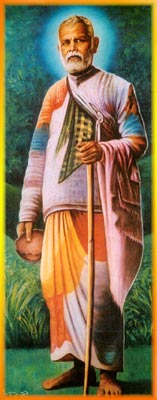Sant Gadge Maharaj
Shri Sant Gadge Baba was the great hero of 19th century and known for his social services. He was a holy saint who worked for helpless and poor.
On 23rd of February 1876, Gadge Baba was born in a washerman's family of small village Shengaon of district Amravati, Maharashtra, India. He lived a life of poverty. In starting days of his life he worked in his own field, when he lost his own land he worked as a wage labor. One day he was at a field and keeping birds away from grain. A sadhu who passes near by him, asked Gadge baba 'if he is the owner of the grains?' This question turned Baba for realization.
After this comment of sadhu Gadge Baba knows the value of community-sharing and keeps it for his whole life time. Community-service become the base of his teachings of Baba. His teachings were:
- Give food to the hungry
- Give shelter to the needy
- Protect the environment
A public teacher, the Gadge Baba traveled from one place to another place wearing his food pan upturned on his head and carrying his trademark broom. When he entered a village, instantly start cleaning the gutters and roads of village. He also told the citizens of village that their congratulations would have to wait until his work was done. For this job, the peoples of village gave money to Baba. From this money Gadge Baba build educational institutions, dharmasalas, hospitals and animal shelters. He conducted his discourses in form of "Kirtans"(a form of discourse which includes devotional songs by Saints). In which he would emphasis on topics like service to humanity, compassion. During his kirtans he would educate people against blind faiths and rituals. He would use Dohas (couplets of a song) by Saint Kabir in his discourses.
Currently almost all organizations build by him are functioning well. On December 20th, 1956 the Great Saint left this mortal world. Even so many years have passed since his departure there is lot of following for him. Government of Maharashtra state also runs a villge cleanliness programme named after him. University of Amravati was renamed as Sant Gadge Baba university.

